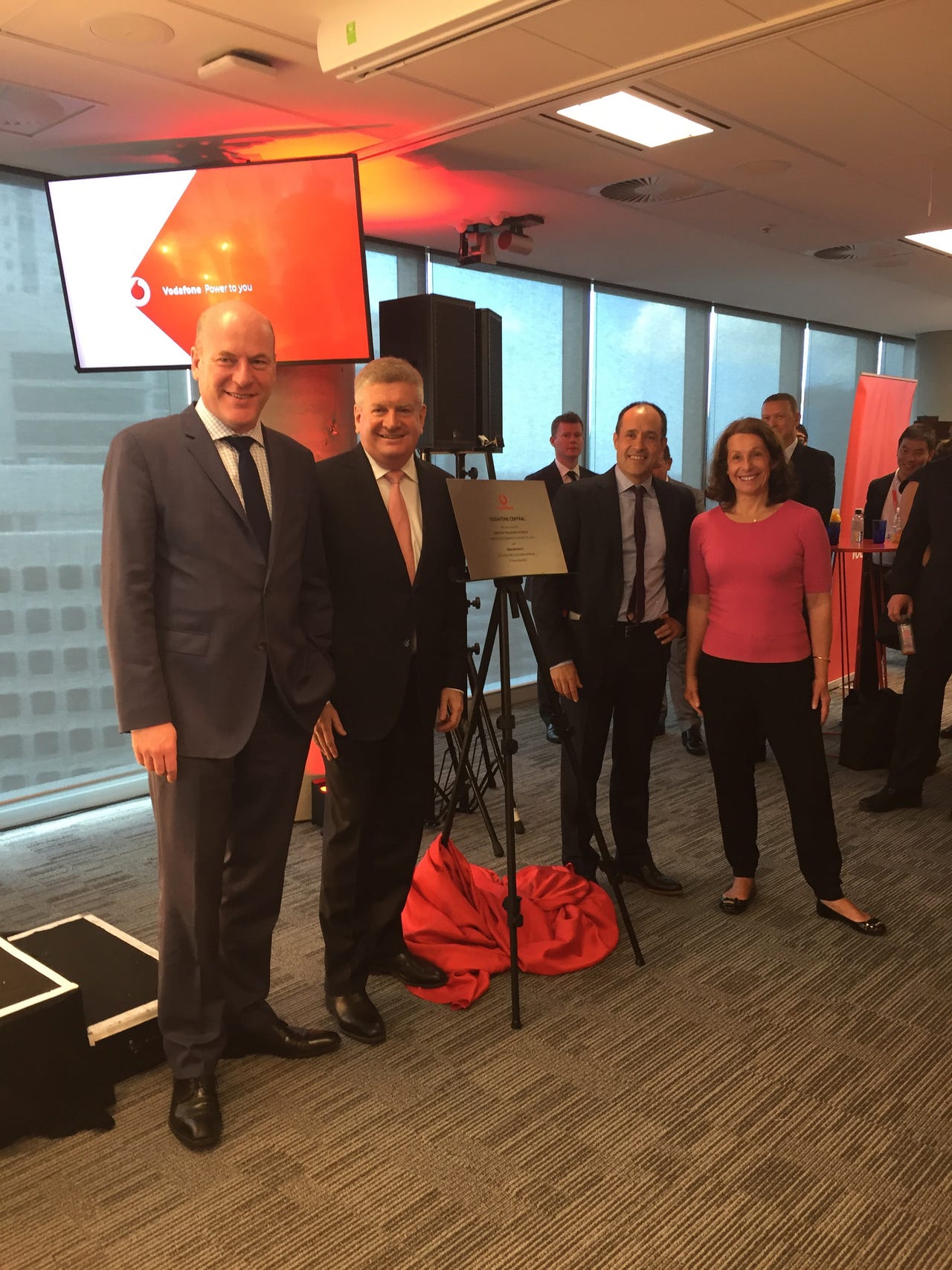Telcos should form organically, except for NBN: Fifield

Australian Communications Minister Mitch Fifield has said the telecommunications industry should operate naturally and organically -- with the rather large exception of the oft-criticised government-planned and operated National Broadband Network (NBN).
Speaking at the opening of Vodafone Australia's new office in North Sydney on Thursday morning, Fifield said the government does not want to get in the way of the market, although there are collaborative and regulatory exceptions.
North Sydney MP Trent Zimmerman, Communications Minister Mitch Fifield, Vodafone Australia CEO Inaki Berroeta, and North Sydney Lord Mayor Jilly Gibson at the opening of Vodafone's new office.
"If we cast our minds back over the history of telcos in Australia ... telcos were really a centrally planned, taxpayer-funded government exercise -- just draw a box around NBN for a moment, put it to one side," Fifield said.
"Vodafone represents the way things are and will be in the future. Telcos will grow naturally, organically, and commercially, which is what we want.
"For our part in government, our chief aim is really to not get in your way, to get out of your way, so we have an important role in terms of the regulatory environment, and there will be occasions where we partner directly with you through various programs like the mobile blackspot initiative."
The NBN has come under fire repeatedly for being both politicised and using out-of-date technology and legacy copper due to the budgeting constraints inherent in a government project.
The Telecommunications Industry Ombudsman (TIO) also revealed overnight that consumer complaints about the NBN for 2015-16 was 13,406 -- a 99.6 percent increase from the 6,715 complaints recorded a year ago, after growing all year.
There have also been reports that the NBN is under competitive threat from wireless broadband.
"All of the protection measures for NBN Co's monopoly are exclusively restricted to fixed-line broadband connections. Mobile broadband and fixed wireless are not captured in this regulatory net -- and probably never will be because of the growth of mobile broadband," former NBN CTO Gary McLaren said in August.
"Significant investment is being placed into wireless technology that enable more spectrum and more fibre connected cell sites to be deployed for mobile and fixed-wireless broadband. The 5G technology road map is likely to mature around 2020."
In a direct reflection of this wireless broadband threat, Vodafone also used the opening of its new office on Thursday -- which Vodafone Australia CEO Inaki Berroeta said was a testament to Vodafone's rapidly improving service -- to conduct its second trial of 5G, this time attaining speeds of around 35.39Gbps.
Latest Australian news
The short-range trial was conducted over the 73GHz spectrum band using 2GHz of spectrum and 4x4 Multiple-Input Multiple-Output (MIMO), with the configuration suited to indoor use of the network, according to Vodafone CTO Kevin Millroy.
"The short-range usage of 5G, which is capable of the highest speeds, is envisaged for indoor buildings or smaller areas such as inside a home, a small business, shopping centre, or corporate office, or alternatively in outdoor public spaces like Sydney's Pitt Street Mall, Central Station, Darling Harbour, and similar areas in other cities," Millroy said.
Vodafone's 5G trial on Thursday was performed in conjunction with Chinese network technology giant Huawei.
"It is fitting that we celebrate the opening of Vodafone's new headquarters [when] we are also celebrating a milestone in the new era of telecommunications with our partnership," said Yan Jun, director of Huawei's Carrier Business Group.
"We are only three years away from the first 5G commercial network globally, and Vodafone and Huawei are ensuring Australia is an early adopter to the great benefits that 5G will underpin."
Both Huawei and Vodafone are focusing on trialling 5G technology -- Vodafone conducted a trial with Nokia in October, while Huawei completed a trial this week with Optus.
The Huawei-Optus trial on Wednesday saw the two attain speeds of 35Gbps over the 73GHz millimetre wave spectrum band, using the Polar Code coding mechanism, while the Vodafone-Nokia trial last month saw throughput speeds of up to 5Gbps using 8x8 MIMO and 64 Quadrature Amplitude Modulation (QAM).
Rival telecommunications carrier Telstra was the first to trial 5G in Australia with Ericsson in September. They achieved download speeds of between 18Gbps and 22Gbps using Ericsson's 5G radio test bed, Massive MIMO, and beam-forming technology.
